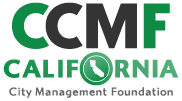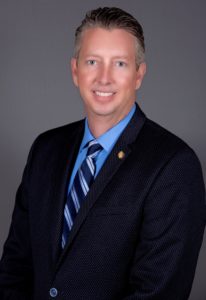Q&A with Aaron Adams: CCMF Board Member and City Manager of Temecula.
What attracted you to a career in local government?
My father, Mike Adams, dedicated over 30 years to local government as a public servant, so I was aware of the profession growing up. However, it was not until much later in life that I came to understand and appreciate the responsibility that comes with a career in local government.
Once I found my entry into a local government position, I learned how diverse local government is and discovered the varied careers and pathways one can pursue. These opportunities were intriguing and interesting, but what led me to seriously consider a career in this field was the fact that local government professionals are situated closest to the people they serve. As such, City employees are accessible to the public. Because of this, an employee can truly make a difference in their respective community and in human beings, regardless of the level of the position they occupy. The diversity of work, challenges and opportunities became very meaningful and attractive in my personal and professional life.
What was your path to becoming a city manager?
I was not resolute in what I wanted to pursue upon graduating from college. By chance, I accepted an internship with the City of Temecula in the City Manager’s office. It was here, working in the Executive Office, that I was first exposed to the varied level of business and responsibilities contained in city government. “Grateful” does not even begin to appropriately describe my feelings towards this opportunity and all the subsequent job opportunities I competed for within the City of Temecula.
My Temecula internship later led to a job as a Management Assistant, which then led to a position with more responsibility as a Management Analyst. Years later, I became a Senior Management Analyst where I served for six years supporting a very inspiring group of leaders in the City Manager’s Office. In 2005, I was privileged to compete for and be promoted to the position of Assistant City Manager for the City of Temecula. After serving in this capacity for an additional six years, the Temecula City Council appointed me as City Manager in November 2012.
My appointment in 2012 came during a time of crisis in the workplace, and it was imperative that I demonstrate leadership and earn the respect and trust of peers, City staff, the community and the City Council. It has been an honor to serve my City and experience the jobs from the very entry level position of an internship to the many positions I held in the organization before becoming the City Manager.
What project are you most proud of from your time as a city manager?
Three milestone projects define my tenure as Temecula’s City Manager.
1. In 2016, Temecula was facing the sobering reality that our costs for public safety services (police and fire) exceeded our projected revenue growth. Communicating this to the public was uncomfortable, but necessary and prudent as we evaluated our fiscal health and looked into the future. As a City that has made public safety its top priority, we had several options to consider and evaluate—some good, and many not so good. Ultimately, we settled on a ballot measure for our community to consider an add-on sales tax measure. This voter-approved measure has been the single biggest fiscal event to occur in the City’s history. Measure S, approved in November 2016, generated the necessary revenue to add police officers, maintain ideal staffing levels on fire engines, open new fire stations, complete important capital projects, and build playgrounds, parks and ball fields, aquatics, teen centers and much more! In essence, Measure S was an opportunity to define quality of life in Temecula for many years to come, and voters were ready to make this investment.
2. In 2019, we were successful in securing a highly competitive grant from the Federal Government for $50 million. The stakes were extremely high: we had managed to secure approximately $80 million for a major freeway improvement with a total price tag of almost $133 million, and the clock was ticking on this funding. To secure this Federal grant, we needed to submit a technically precise application, demonstrate strong community and regional support for the project, and build political support at all levels of government—especially at the Federal level. The $50 million Federal grant closed the funding gap and made this project a reality, which will have profound positive impacts on transportation in and around our community: substantially reducing traffic congestion and improving safety conditions along Interstate 15. The project is slated to break ground in late 2021.
3. In March 2020, the world as we know it began to change and shut down. We were thrust into a global health crisis, followed by another crisis as calls for racial justice came to a tipping point. There was no City Manager handbook or webinar on what to expect regarding the difficult decisions cities would be required to make and the recommendations city managers would need to consider for our communities. While we still remain in a state of emergency, Temecula is still standing strong, working hard and serving our community. We have developed creative ways to feed our most vulnerable populations, check in with residents and tackle the digital divide by creating Wi-Fi gardens for our stay-at-home students. We have been innovative with our use of and investment in technology, pivoting to an electronic City Hall system. We have managed to safely staff our city operations, roll out telework policies, stay engaged with our workforce and remain connected with our residents and businesses. We have engaged in challenging conversations surrounding racial justice with the public; as a result, we have instituted and launched a Race, Equity, Diversity and Inclusion 7-member Commission driven by the City Council to better our organization and community. Weathering these storms has required an immense amount of collective wisdom and resolve.
What do you enjoy most about being a city manager?
I enjoy that no two days seem to be the same. Each and every day has a semblance of routine but each day also brings with it new challenges and opportunities. It’s these challenges/opportunities I thoroughly enjoy tackling with a dedicated team of professionals for the betterment of our residents/businesses. In addition, being a City Manager means you possess the privilege of effectuating resolutions and making decisions that often involve someone’s life, possibly their quality of life. This is one of the greatest honors of a City Manager in making an actual difference in someone’s life. I also consider Temecula a blessed City and how my role as City Manager, in many ways, is part of my ministry.
When and how do you interact with the residents of your city?
Some traditional interactions in person are just not possible during the COVID-19 crisis, but I routinely correspond via emails and phone calls from members of the public. Members of the public will oftentimes bring something to the City Council through a public meeting, and it is then incumbent upon me to follow up directly with the resident or delegate this responsibility. By utilizing available technology, we are able to maintain consistent internal and external lines of communication where quality and quantity are not mutually exclusive concepts.
Under normal circumstances, our City routinely holds public workshops, charrettes, road show presentations to various civic and community groups providing, and other meetings involving public and private development projects, City finances and general question-and-answer sessions.
What are two of the greatest challenges facing city managers in California today?
Managing the fiscal health of a City during a global pandemic is one of the current greatest challenges facing city managers. Cities and local government agencies are still waiting for Federal and State legislation and financial relief given the devastation of loss of revenues to local budgets and the continued expectation that cities maintain or exceed non-crisis service levels.
Remaining politically neutral is the second challenge. Over the last few years, divisive political rhetoric on the state and national level, deepened by tragic national events, has infiltrated nonpartisan local government like never before. It is very important that, as neutral leaders, city managers be aware of such influences and events yet remain laser-focused on what is needed in local communities.
As a city manager, how do you help uphold the public’s trust in local government?
You uphold the public’s trust by not giving them any reason to distrust you to begin with. You maintain their trust by being honest, forthcoming, responsive, accessible and transparent. You maintain their trust by informing the public about what is going on City Government, why, how, and the associated costs and details. The public deserves to be well-informed. As the leader of the organization, it is my responsibility to put into place the mechanics to demonstrate this level of sharing and disclosure. For the City of Temecula, this is achieved through a variety of means: electronic newsletters, mailed and printed newsletters, social media, videos of public service announcements, appropriate and timely distribution of press releases (covering both good and bad news), public workshops, clean financial audits and disclosures, establishing an employee culture of good customer service, and a positive attitude toward public service.
How does the issue of local control impact the future of California?
I have yet to meet any local official that appreciates being told by the State or Feds they must or cannot do something in their respective city. We must continue to advocate for the preservation of local control for incorporated cities, and jointly guard against attempts to erode local control. This is preferred for a variety of reasons not just by local officials, but also by residents and businesses that depend upon us for their services, resolutions and needed support. It is critical that we remain proactive in fighting attempts to chip away at this privilege and responsibility.

